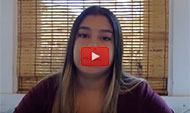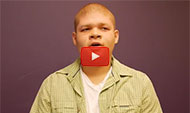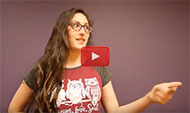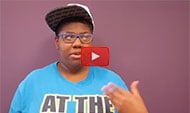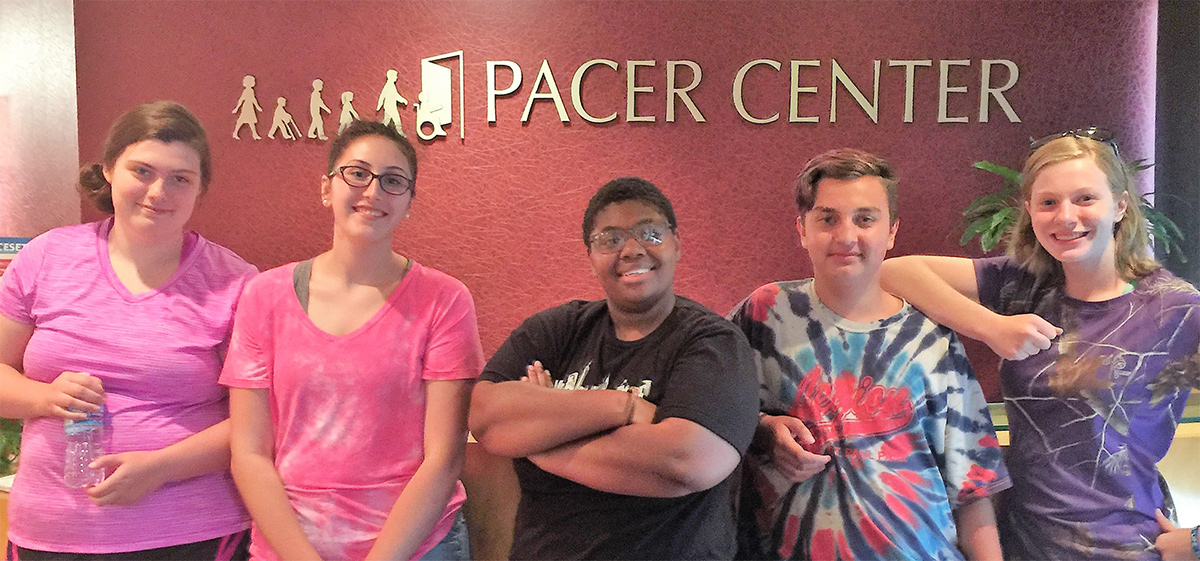
Introduction to the Youth Advisory Board
Members of PACER's Youth Advisory Board on Children's Mental Health share their experiences. (3:40)
Youth Advisory Board
Youth Advisory Board Positions are Available
- Monthly meetings
- Presenting at conferences, staff trainings, and other public speaking events
- Providing input on articles, publications, and to organizations serving youth with mental health challenges and their families
- Participating in volunteer activities related to mental health
- Communicating with elected officials regarding the mental health needs of youth
-
The Youth Advisory Board developed a Peer Support Comfort Agreement that is reviewed and honored at each Youth Advisory Board meeting. The intention of the Comfort Agreement is to ensure that all members are heard equally, without bias, and are given opportunity to participate. The Comfort Agreement is reviewed at the beginning of each Board meeting.
Peer Support Comfort Agreement:
- President will inform the board when a topic is open for discussion
- President will recognize each speaker when the speaker raises his/her hand
- President will inform the board if the topic being discussed is part of an ongoing conversation and hands do not need to be raised in order to participate
- Members should not interrupt another member when they are speaking
- Members should respect each other’s opinions and right to speak
- Members will try to follow the rules
- Board members can ask to review the Comfort Agreement at any time
- The Comfort Agreement will be read and reviewed at the beginning of each board meeting
Learn More
Featured Series: Preparing for Adulthood
PACER’s Youth Advisory Board on mental health discusses topics related to transitioning from pediatric health care to adult heath care. This 4-part series includes tips for teens and young adults on: coordinating your own health care, how medical providers and teachers can help you taking charge of your own health care, preparing for your own medical appointments, and understanding the benefits of guardianship.
Video 1: Who Helps You Coordinate Your Health Care?
Teens discuss who helps them coordinate their own health care and the strategies they use to organize themselves. The role of a “care coordinator” is defined.
Video 2: What Can Medical Providers and Teachers Do To Help You Take Charge of Your Own Health Care?
Teens respond to questions about their preferred method of communication for health care information. They express a preference for easily understood explanations, information formatted in pamphlets or written on flash cards, and health care providers who communicate directly to them. A general concern most often expressed is when to transfer to an adult health care provider.
Video 3: How Do You Prepare For A Medical Appointment?
Teens describe how they prepare for a doctor’s appointment. Strategies that work for them include: making a list of concerns and questions for the doctor, having your insurance card with you, checking in, scheduling an appointment and arranging for transportation to the appointment.
Video 4: What Does Guardianship Mean To You?
Discussion about what guardianship means. For these young adults, guardians are seen as coaches, leaders, decision makers, record keepers and as the gateway to health care.
Activities
The Youth Advisory Board members give presentations at national and statewide conferences as well as at school staff trainings. By speaking frankly about their experiences with mental health needs, they give audiences insight into the day-to-day struggles of having mental health issues, ways they have managed these issues, and ways that teachers, providers, parents, and peers can give appropriate support. The following are examples of their activities in the community.
Youth Advisory Board members attend an annual retreat and participate in monthly meetings
The purpose of these events is to develop community and an understanding of each other’s perspectives and life experiences. Read More …
- One retreat featured a speaker from Augsburg College’s Disability Services Office who talked with the teens about how to have their needs met in a post-secondary setting. After the speaker, the teens held a cookout and went tubing and fishing.
- At another retreat, the Board held a bowling event where members ate pizza, bowled, and socialized.
- Youth Advisory Board members have worked with an art therapist. Fostering creativity is another goal of the group, and board members created canvases to depict their story of stopping the stigma surrounding teens with mental health challenges. The banners now hang at PACER Center.
- Monthly meetings are held at PACER Center. Over pizza, board members share issues of concern and celebration, and use Robert’s Rules of Order to manage the meetings.
Youth Advisory Board members present at statewide mental health conferences
Each year the Youth Advisory Board participates in Annual National PACER Symposium About Children and Young Adults with Mental Health and Learning Disabilities. This conference is attended by more than 1,000 parents, teachers, providers, youth, and mental health professionals. The Youth Advisory Board features a creative project for each presentation to energize the audience to support programs for children with mental health challenges. At the symposium, the Youth Advisory Board has created and performed: Read More …
- “Preparing for Adulthood: Taking Charge of My Own Health Care,” a series of 4 videos that highlight the challenges and accomplishments of teens with mental health needs as they transition from pediatric to adult healthcare. The videos feature the teens talking about their experiences on the topics of Guardianship; How to Prepare for an Appointment with your Healthcare Provider; Who helps you coordinate your Healthcare; and What health care providers and others can do to help you take charge of your own health care.
- “Make Stigma Disappear,” a music video that identifies the challenges a teen with mental illness faces, and suggests supportive strategies. The presentation included members sharing their own stories of what it means to be a teen with mental health challenges.
- The mental health version of the game show “Family Feud.” Youth Board members re-created the game show using a survey sent to more than 100 people that had questions related to facts and myths about mental health. Teams included Youth Board members and audience members.
- “The Voice: Teen Mental Health Edition.” Board members highlighted their challenges through individual videos representing their personal journeys. This included storytelling, an original rap song, a cello performance, an original poem, interpretive dance, and a documentary on teen depression.
- The Youth Board members also hosted a resource table with information about the board and written resources they had created to help support youth with mental health challenges.
Youth Advisory Board members provide strategies to help teens with mental health challenges
The Youth Advisory Board provides its perspective on emotional or behavioral challenges through articles and publications, and through presentations to organizations serving youth with mental health challenges and their families. Read More …
- Youth Advisory Board members wrote and published a PACER handout series providing tips for teachers and parents working with teens who have mental health challenges.
- The Youth Advisory Board has been featured in numerous articles published in “Pacesetter,” PACER Center’s primary newsletter.
Youth Advisory Board members volunteer in the community
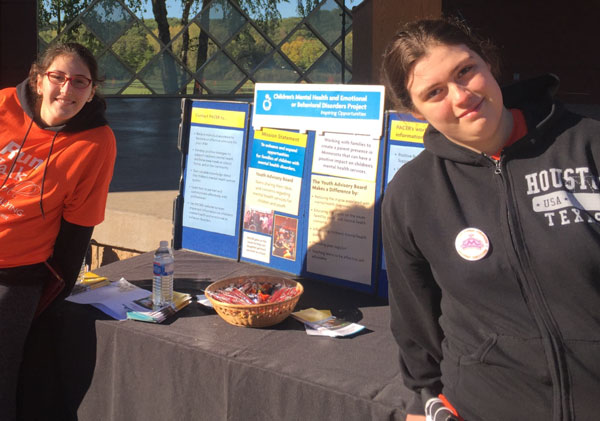
Their visibility and role modeling for other teens with mental health challenges at community events demonstrates their concern and care to the public. Read More …
- The Youth Advisory Board has participates as a “cheer team” for PACER’s Run Walk Roll Against Bullying. PACER holds this annual event in October during National Bullying Prevention Month, and positions “cheer teams” throughout the course to encourage participants. The teens also take part in the bullying prevention rally held at the event.
- The Youth Advisory Board volunteers each year for the Edina Lions Club Annual Pancake Breakfast. The Lions Club holds this fundraising event where the Youth Board volunteers to set tables and act as servers. Information about the Youth Board and PACER is provided for attendees at a resource table.
- The Youth Advisory Board volunteered at the grand opening of an innovative Senior Living Community and served a meal to community members, staff, and residents. Members of the board were able to share their experiences and offer PACER resources.
- Members attend various mental health fairs in the community with PACER staff to share their stories and network with other teens.
The Youth Advisory Board participates and presents at national conferences
These events raise awareness and help decrease the stigma surrounding teens with mental health challenges. Read More …
- Members presented at the Minnesota Association for Children's Mental Health Annual Conference, where they made a presentation called, “Myth Busters: Uncovering the Truth about Youth with Mental Health Needs.”
- The Youth Advisory Board participated in a National Parent Training Conference where members shared their insights on being a teen with mental health challenge, and offered strategies and tips on how to successfully support such teens.
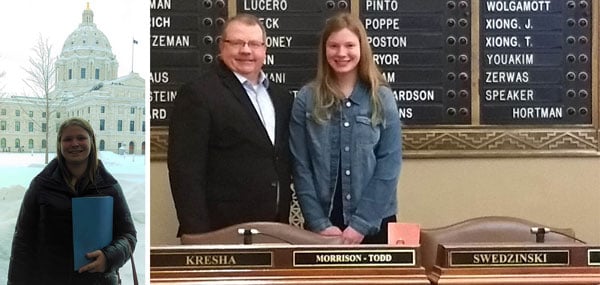
Left: Grace Laski, vice president of the PACER Youth Advisory Board on Mental Health, met with legislators for PACER’s Day at the Capitol in March 2019 to share her story and the need for better transition services for post-secondary education. Right: Darcey Hayes, president of the Youth Advisory Board, met with Senator Kresha to share her story of how school linked mental health services to promote her success.
Youth Advisory Board members are active at the Minnesota State Capitol
By learning how to encourage their elected state legislators to consider the needs of teens with mental health challenges, board members are developing leadership skills. Read More …
- The Youth Advisory Board participated in a bullying prevention rally at the Capitol and signed a petition to stop bullying.
- Youth Advisory Board members participate in PACER’s Day at the Capitol: “Be a Champion!” They prepare by learning how to use the legislative agenda and their personal stories to influence policy change.
- Members lobby their legislators through personal visits to support increased funding and new laws to better support the needs of children and teens with mental health challenges.
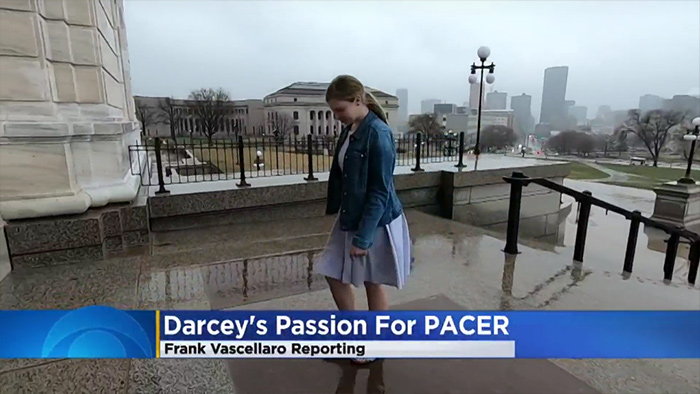
‘I Feel Amazing’: Teen Touts Transformative Help from PACER
Recently, 16-year-old Darcey Hayes joined PACER staff and supporters at PACER’s Day at the Capitol. When she arrived at the Minnesota State Capitol, she marched in to meet her state representative, Ron Kresha.
The sophomore from Upsala is the president of the PACER Youth Advisory Board. Though not able to lobby or talk about legislation, she can share how special education works and her experience with it.


